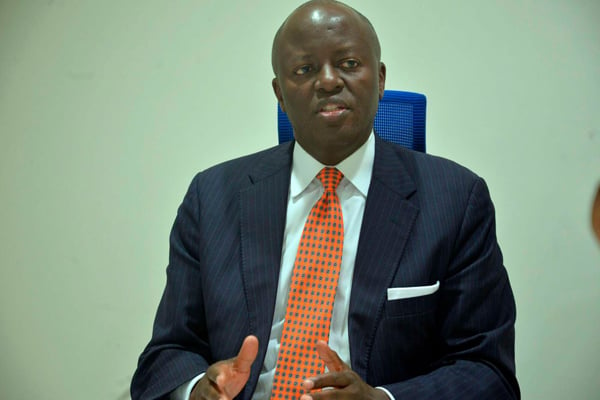
From left: Former Diageo CEO Ivan Menezes, EABL CEO Jane Karuku, former Kenyan Tourism CS Najib Balala and EABL Chairman Martin Oduor. Photo | Courtesy
Uganda Breweries Ltd (UBL) could soon be entirely owned by its Kenyan parent company, East African Breweries Limited (EABL), if the Tuesday tender offer to purchase its minority stake valued at Shs12.3 billion is successful.
EABL plans to buy up to 2,177,995 ordinary shares, which translates to 1.81 percent of UBL’s total share capital. Currently, the parent company holds 98.19 percent of UBL, making this offer a move to acquire the remaining minority shares.
The giant brewer is offering Shs5,630 per share, significantly higher than the current share price of Shs4,388.24, up from Shs3,452.93 a year ago. This premium offers a lucrative opportunity for UBL’s minority shareholders, who are mostly retail investors.
The exact reason behind EABL’s move to fully acquire UBL is not publicly disclosed. However, industry insiders speculate it might relate to the stake previously held by the late Dr Martin Aliker, UBL’s former chairman who passed on in April. UBL told Business Outlook in an email that EABL is making this tender offer “to consolidate its ownership and streamline operations.” The offer values UBL at Shs670.4 billion, compared to EABL’s existing stake in the Ugandan unit currently valued at Shs659.2 billion.
Offer Details
To determine the tender price, EABL’s Board of Directors engaged Mazars BRJ, a certified accounting firm in Uganda, which used a combination of the Market Multiples Approach (Enterprise Value to EBITDA) and Discounted Cash Flows (DCF) methods to arrive at the offer price. This basically means that this firm must have compared UBL to other similar companies and looked at how much money those companies make before certain expenses (like interest and taxes).
This is like thinking about how much money you’ll save or earn in the future if you buy a company’s stock today. You consider how much money you'll get back over time and then figure out what all that future money is worth right now.
Current UBL shareholders can decide whether to accept the offer which is on a "willing buyer, willing seller" basis, without any pressure to sell. The tender offer is open for six months, running until March 3, 2025, and is available only to shareholders recorded by September 2.
UBL assures shareholders that those who choose not to sell can retain their shares without any repercussions. They also have the option to sell after the tender period, although the terms and prices may differ.
While there are no direct fees for participating in the tender offer, UBL advises shareholders to consider potential tax implications, such as capital gains tax. Consulting a tax advisor is recommended to understand individual tax consequences, it said in an email to shareholders about the offer.
Performance
In January, EABL shared its financial results for the last six months of 2023. The scorecard showed mixed performance. While the company’s revenue grew, profits took a hit due to rising costs and other challenges. The giant brewer saw its gross revenue increase by nearly 14 percent, reaching Shs3.4 trillion.
After accounting for various expenses, net revenue rose by 16 percent, hitting Shs1.9 trillion. However, profit after tax dropped by 22 percent to Shs193.9 billion, meaning the company is keeping less of its earnings as profit compared to previous periods.
The company’s expenses are, in the meantime, climbing fast. Taxes alone grew by 10.8 percent Shs1.5 billion, something that’s equivalent to 44.1 percent of its gross sales in the last six months of 2024. In the first six months of 2023, it was 45.3 percent and 43.3 percent in the first half of 2022.
The company's cost of production increased by over 20 percent to Shs1.1 trillion. This is because the cost of sales increased from 29.3 percent and 53.6 percent in the first half of 2023 to 31.1 percent and 55.7 percent in the second half, respectively.
This, the company told its shareholders, was partly due to increased taxes on key materials like glass and sugar, along with higher fuel and electricity costs, something that exacerbated the elevated operating costs that many firms were already facing in the region.
Additionally, new tax laws in Kenya are making it tougher for EABL to manage its cash flow, as they now have to pay taxes daily instead of monthly.
In an interview with Business Redefined, EABL’s Chief Financial Officer, Risper Ohaga said “It is extremely problematic.” She added that, administratively, “it means you are reconciling your accounts daily. When we had it monthly, you close your books, you reconcile your numbers, you are sure you have done the right number, the right submission, you can reconcile it to your general ledger and you are correct. Now you pay the excise which is a consumption tax you are now paying it the minute you remove it from the store. You don’t know whether you’ve sold it or not.”
The intent, she proceeds to note, “was to deal with the illicit.” It didn’t, she goes on to offer, have “any impact on them.” If anything, Ohaga opines that “it has actually punished the compliant tax-payers even more.”
Challenge of cost
The weakening Kenyan shilling has also hurt EABL’s bottom line. Foreign exchange losses skyrocketed, taking a significant chunk out of operating profits. On top of that, higher interest rates have made borrowing more expensive, further eating into profits.
However, Jane Karuku, EABL’s CEO, reassures investors that the company is concentrating on cost efficiency through enhanced procurement, improved supplier negotiations, optimised manufacturing operations, and efficient cost management.
“We need to keep expanding our margin because there is a big challenge of cost. We must be cost-efficient as a business and do everything necessary to ensure we’re growing our margins,” she said in January.
The regional brewing giant is now investing tremendously behind its brands to rejuvenate its revenue. Advertising and promotion costs rose by 16.5 percent to Shs174 billion by the close of 2023. EABL’s total assets are worth Shs3.8 trillion, a figure that surpasses its total liabilities which are worth Shs2.9 trillion.
Stock analysis
EABL offers a dividend yield of 4.61 percent, which is higher than the bottom 25 percent of dividend payers in Uganda’s stock market (average 4.04 percent) but lower than the top 25 percent (average 13.68 percent). This makes EABL a reliable, though not top-tier, dividend payer.
With a cash payout ratio of 37.1 percent, EABL ensures its dividend payments are well-covered by cash flows, providing financial stability even if cash generation dips. But this is delicate in case the company fails to generate enough cash in a year.
There are so many factors that can contribute to this like the tax environment, illicit alcohol, a slow economy and the cost of borrowing money that has skyrocketed lately.
The company’s shareholder’s earnings per share have risen from Shs250.999 in 2013 to Shs298.145 in 2024, with a peak of Shs442.637 in 2021.
New shareholders, who buy EABL stock within the next thirteen days (from September 4), will receive the next dividend of Shs171.082 per share if they are registered by September 17, on October 28, 2024.
The dividend to be paid in October is a 27.27 percent increase to Shs199.6 per share, or Shs156.8 billion in total.
This will be higher than the Shs156.825 per share last year, but smaller than Shs313.651 per share that the company distributed for the year ended June 2022.
The company’s board proposed a final dividend distribution of Shs199.596 for the year ended June 2024 but Shs28.5137 was distributed in April. The prior period had Shs124 billion distributed.








